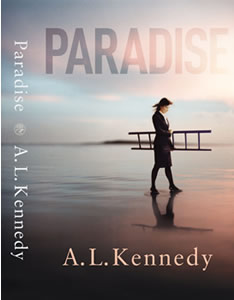Friday, October 15, 2004

Paradise
Title: Paradise
Author: A.L. Kennedy
Publisher: Jonathon Cape
Night Geometry And The Garscadden Trains was published in 1990, the first collection of short stories by the author A.L. Kennedy. She followed that with her first, and elusive, novel Looking For The Possible Dance, which saw her selected as one of Granta’s Young Novelists in 1993. Since then she has published another couple of short story collections – Now That You Are Back, Original Bliss, and most recently Indelible Acts. As well as another couple of novels – So I Am Glad and Everything You Need.
With 2003 and the return of Granta’s Young Novelist selection, a selection made every ten years – Kennedy became the first novelist to have been chosen twice. With the Granta magazine that printed short stories/extracts from the winners, Kennedy supplied an extract from her fourth novel by Paradise. A novel which has just been published in September of 2004 in hardback by Jonathan Cape, a division of Random House, who are also responsible for Vintage, through whom her back catalogue is available.
Having only just picked up Looking For The Possible Dance at the same time as the promotional appearances for Paradise, I can only really comment on how Paradise compares to So I Am Glad and Everything You Need. Her short stories tending towards brevity, the sort of literary snap-shot that doesn’t necessarily really say anything. Like those other novels, Paradise is a curious mix of skewed humour and melancholy, especially given that the characters at it’s core are alcoholics. Which probably technically makes Hannah Luckraft Kennedy’s bleakest character in some ways, though perhaps the occasionally suicidal male lead in Everything You Need would give her a run for her money.
Hannah Luckraft is an alcoholic, and in those terms her idea of “paradise” is fluid, literally. Her visions of liquid almost take on a pornographic life of their own, as she wallows in the sloshing motions of bottles, in the physical changes she monitors in her lover’s body as he achieves paradise. Hannah is also an unreliable narrator, which is part of the point of the novel, but also at times makes the story difficult. Events being interspersed by blackouts and failed recollections as they are.
With that the narrative like paradise is fluid, following at it’s core the relationship between Hannah and Robert. Both of whom are alcoholics, prone to disappearances and health problems as their addictions gain momentum. Robert is the first to try and quit, disappearing without explanation to a facility in Canada. On his return though it isn’t really long before Hannah tips him back into his fluid delights. However it is then her turn to fall, waking up in hospital, before herself being transported to Canada to dry out. Which pretty much establishes a pattern of stuttering sobriety, followed by a form of blacked out and personal carnage. Of course, while this cycle goes through it’s motions, it becomes clear that this can not go on – even if they could get a way with alienating and offending everyone they know, their forms are fragile fluid bodies.
Which may not sound particularly amusing, but Kennedy has such a turn of phrase, that speaking through Hannah we are offered a drunks logic, where everything makes sense within that limited context. There is also a certain tongue in check outlook that comes through in Hannah’s voice, she is quite flip, at least when she is coherent enough to provide a running commentary on life, the universe and the contents of a bottle. While Everything You Need was set out Scotland, Kennedy returns to her native Dundee for Paradise. Though you wouldn’t necessarily know that, as she explained while reading from Paradise, at no time does she name the city for fear of association. Ultimately however, location isn’t necessarily of importance, given the lifestyle of Hannah and Robert this could be a city anywhere. More spatial impact comes from the travels in Canada and the time spent in the Clear Spring facility – partly because of the change of scenery and also because of the forced sobriety and the strangely distressing world view that provides.
Paradise is a strange novel, which to be honest is kind of to be expected from A.L. Kennedy, who at times seems to be a wilfully deviant writer. Everything You Need revolved around a writer, who kind of gained inspiration from failed suicide attempts, while trying to get to know his estranged daughter. While So I Am Glad saw Cyrano de Bergerac wake up 300 years after his death in a flat in Glasgow to start a relationship with a woman who did voiceovers for local radio. So the convoluted life and times of two alcoholics punctuated by a series of blackouts isn’t necessarily anything remarkable. It does leave on problem though, Paradise can feel a little directionless at times, looping to some degree. In particular the conclusion sees Hannah really hit rock bottom, which is related through a sequence particularly difficult for the reader to follow. Leaving a certain ambiguity in conclusion. Still A.L. Kennedy remains one of the most accomplished and at times seemingly under-rated of Scottish novelists.

Comments:
Post a Comment
 this is the voice of re:mote induction.
this is the voice of re:mote induction.